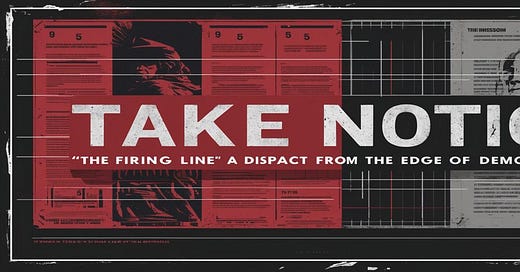How Did We Let It Get to This Point?
An analytical inquiry into the slow-motion collapse of American Democracy
Democracy doesn't vanish in a single act. It corrodes. Quietly. Culturally. Internally. What we’re witnessing today is not the sudden failure of a political system but the result of decades-long erosion of critical faculties, civic rituals, and moral cohesion.
To understand how we reached this point, we need to step outside the churn of daily headlines and examine the foundational breakdowns that allowed democratic rot to take hold. This is not merely a tale of politics, but of psychology, culture, and information.
Cultural + Cognitive Decay
Our capacity for critical thinking has thinned. Public education, once a cornerstone of civic literacy, has been hollowed out by standardized testing and underfunding. In its place, we’ve prioritized performance over process, a metrics-driven system that doesn’t teach students how to think, but how to pass.
At the same time, media platforms traded depth for dopamine. Nuance lost to outrage. Tribalism overtook dialogue. Attention became currency, and complex truths couldn’t compete with clickbait.
Underlying it all is a long-standing thread in American life: anti-intellectualism. Suspicion of expertise and contempt for complexity aren’t new, but now, they’ve been weaponized. The distrust once reserved for “big government” now targets science, journalism, and even reality itself.
When facts become optional, democracy becomes impossible.
And through this fog emerged the perfect avatar: Donald Trump—a man unburdened by truth, lifted by spectacle. The nation didn’t just tolerate him. It tuned in, cheered, shared, and normalized him. Entertainment eclipsed ethics, and it stuck.
Emotional Engineering
The authoritarian playbook is old, but now it’s digital. Hate, fear, and greed are among the most ancient motivators. They override logic, empathy, and community, especially when amplified in algorithmic echo chambers.
The American right mastered this terrain. Disinformation networks, talk radio, cable propaganda, and social media coalitions didn’t just appear overnight; they were built, funded, and fine-tuned for conversion and control.
By contrast, the left and center failed to evolve the emotional counterforce. They brought facts to a fight of feelings.
And while platforms like Facebook, YouTube, and Twitter claimed neutrality, their business models thrived on conflict. They didn’t just fail to prevent democratic decline. They monetized it.
Psychological Blind Spots
Even now, many Americans believe “this can’t happen here.” That’s normalcy bias—the mental reflex that tells us the past will predict the future. But it won’t.
There’s also learned helplessness, he belief, after repeated political betrayal or failure, that action is futile. So we scroll. We react. But we don’t mobilize.
And then there’s distraction saturation. The news never ends. The outrage cycles faster than we can process it. There's no time for grief, digestion, or real resistance. We don’t absorb what we’ve lost; we’re already being told to care about something else.
Worst of all, we’ve abandoned the moral rituals that once connected civic duty to personal character: voting, public service, community organizing, and protest. These aren’t just habits; they’re how democracy renews itself.
The Disease Behind the Symptoms
What you feel isn’t an overreaction. It’s recognition. We are living through a moment when truth is subordinate to power, when spectacle replaces substance, and when we risk becoming a people no longer capable of self-governance, not because of one man, but because of what we collectively tolerated, indulged, and ignored.
What Must Be Done Now?
If democracy decays through neglect, it must be rebuilt through attention—fierce, sustained, and collective.
The first act is not voting. It’s awakening. We must recognize that civic literacy is not a niche concern; it is the immune system of democracy. We need to treat misinformation not as a glitch, but as a deliberate virus engineered to paralyze our critical thinking and pit us against each other. Rebuilding starts by making civic education, not just history, but also how government actually works, a daily practice. And not just for kids. For all of us.
We must reinvest in community, not just in the geographic sense, but in a civic sense. Attend local meetings. Join library boards. Protect school curricula. Reclaim public space from private influence. If we’re not shaping our communities, someone else, often with darker intent, is.
We must revitalize moral habits. That means voting in every election, not just the ones that make headlines. It means rejecting apathy as complicity. It means resisting the comfort of cynicism, which masquerades as wisdom but delivers only disengagement.
We must amplify integrity. Elevate truth-tellers, even when they’re imperfect. Support journalists, educators, artists, and whistleblowers who still tell it straight, at cost to themselves. In a world drowning in spectacle, their courage is revolutionary.
We must organize ourselves emotionally, not just intellectually. Authoritarians win because they tap into deep fears. We must tap into deeper hopes. We need songs, symbols, stories, rituals, and movements that feel as urgent and sacred as the rights they defend.
This is the fight of a generation. But it’s not just a political fight. It’s a cultural reclamation—a civic resurrection.
And it begins wherever you are, with your voice, your choices, and your refusal to look away.





Superb. Everything critical examined and stated so clearly.
Good advice and good insights. The unquestioning patriotism of my childhood was replaced by cynicism as we learned more truths about the Vietnam. Truman , then Eisenhower were presidents in my childhood, and the first election campaign I can remember was that of JFK. Johnson inherited a Vietnam mess so bad he probably stood no chance of reelection. (I since started reading Robert A Caro's biography series about Johnson; incredibly informative about politics in general) Nixon's presidency sealed the deal on distrusting government. Ford pardoned him in an attempt to unify the country, but the action also increased cynicism. I had hopes about Carter, but he seemed out of his league at times. Generally I have been somewhat cynical of every president since, though was very favorable of Obama, and detested Trump from the beginning of his last "reign". I voted for Hillary Clinton, but thought she was out of touch with most Americans. So.. where did the cynicism begin? Mostly with Nixon. But Democrat Bill Clinton disgusted me with his outside connections and generally disrespectful attitude towards the office.
I tried to summarize history of presidents in my effort to identify a turning point, but I cannot within that context. Technology probably also plays a role. We now receive and exchange information instantaneously. We seem to have no time for carefully considering options. It probably "takes a village"...